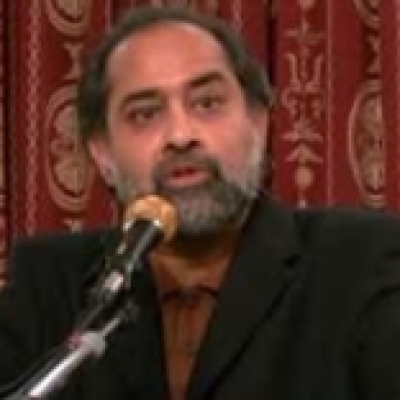



 Afeef Khan
Afeef KhanBlaming God makes it easy to give in to the human demi-gods’ way of running things and to not have to do anything of real value to make the situation better.
As we continue to observe the unfolding human tragedy in Pakistan, caused in part by the unprecedented flooding of the Indus River, I am reminded of a statement made by an American friend of mine who was commenting on the Haitian earthquake and the ensuing human upheaval in its aftermath. She said, “God hates poor people.” Of course, not accepting personal responsibility for the condition of the world in general, and the rapidly degrading regional conditions in particular, is not just a characteristic of Muslims living in majority Muslim countries.
There appears to be a human tendency to deflect blame — and in the historically secularized West, God has always been an easy, if not acceptable, target — so that one does not have to deal with, mentally, emotionally, and practically, the real genesis of problems locally as well as globally. Regional problems, such as the inability (in the 21st century no less!) of “developing” countries to deal with natural disasters, are connected to global systems of abuse, neglect, and exploitation. What my friend should have said is, “The rich hate poor people,” or “Corporate power turns a blind eye to suffering because it is bug-eyed for profit,” or “Insecurity resulting from inaccessibility to a simple shelter or a subsistence level of food is related to an inaccessibility to the abundant wealth of the earth.”
Blaming God makes it easy to give in to the human demi-gods’ way of running things and to not have to do anything of real value to make the situation better. Such an apathetic attitude is not simply the preoccupation of Muslims; it also afflicts the self-satisfied West to the same degree. And that is because a God-denying system dominates the entire world, not just the Muslim world.
Even though the way the world’s only superpower (mis)handled Hurricane Katrina is still fresh in our memory, there is a generally accepted notion that the poorer countries of the world are in no position, are too backward, or just do not have the resources to be able to weather natural catastrophes, and that in such situations, the poor are much more likely to be deleteriously affected than the rich, or the governments they control. The effects on the ground are enough to set aside any arguments on this point. The tsunami in Indonesia, the cyclones in Bangladesh and Myanmar, the hurricanes and earthquakes in the Caribbean (Haiti, Dominican Republic), the famines in Africa, and most recently the floods in Pakistan all come to mind.
The images of human suffering are not only gut-wrenching, but consistently congruent wherever the cataclysm erupts, and the conclusion ought to be equally inescapable: the mass of suffering takes place where the mass of dark-skinned people in the world are in a majority. The impact of racist power on human suffering, and its associated policies leading to environmental dilapidation, wealth polarization, the marginalization of local agriculture by predatory trade, the perpetual degradation of civil structures of “inferior” races, and constant wars of aggression, should be atop every mind of conscience and in every beating heart.
The situation in Pakistan, a poor country, in not an anomaly. It can be compared with any other poor country trying to deal with a national emergency in a reactive way when the disaster is right upon it. We Muslims still tend to suffer from the delusion that if we solve our problems on a local and regional level (this is certainly a big part of the puzzle and it is not being minimized here), everything will be hunky-dory. And we are often put on the defensive by the exploiters and their absent-minded supporters when they say, “What have you done in your own countries?” As if “our countries” are historically, developmentally, economically, politically, and even religiously disconnected from “their countries.”
In recent memory, Imam Khomeini was the only world leader who connected a vibrant program of national reconstruction, self-awareness, and self-assertion to liberation from a globally corrupt power culture that brings along with it, its corrupt civil institutions, corrupt socializations, and corrupt worldview based on a racist, phobic, and exclusivist narrative of human history and potential. He successfully gave his people confidence to stand up for truth and justice and upon this his people built a meaningful, expressive, and impactful social structure; whether they are able to sustain this momentum largely depends on how true they are to their Imam’s convictions. Certainly the Qur’an sustains the Imam’s methodology, as Allah (swt) instructed His prophet Musa (a), “Go to Pharaoh: he is the one who oppresses [with concentrated power]” (20:24). The source of all collective human suffering is the abusive exercise of human power, and it is this problem Allah (swt) encourages us to identify, it is this “shirk” He implores us to eradicate, and it is these mushriks He wants us to chasten.
Given the historical legacy we Muslims share with the present-day colonial and imperial expression of the long-standing Judeo-Christian antipathy for Islam, Muhammad (pbuh), and Muslims, looking at the US/UK/Saudi destabilization of Pakistan and figuring out who did what tends to get murky. So let us look at an older entrant into the “community” of nations and see if its difficult and abortive attempts at self-determination shed some clarity on the bad situation in Pakistan. Let us examine how US and French influence have combined to deliberately manufacture the destruction of a barely born Haiti, affecting its ability to deal with anything, let alone the recent earthquake.
